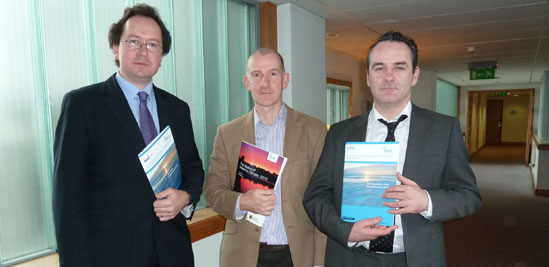2013 Press Releases
UCC research informs actions on climate change

New results from research carried out at UCC show that the technologies now exist to reduce greenhouse gas emissions from the energy sector by up to 95%.
With mounting evidence highlighting that the earth has warmed significantly over the last century, such research is welcome news as humanity attempts to wean itself off fossil fuels. Results from three different climate change research projects conducted by research centres and groups within the Environmental Research Institute (ERI) at UCC, launched on February 7th at an EPA research event, “Informing Actions on Climate Change”.
These reports, accompanied by other reports from UCD and NUI Maynooth, were launched by Minister for the Environment, Community and Local Government, Phil Hogan, T.D. Speaking at the event, Environmental Protection Agency (EPA) Director General, Laura Burke, commented that: “Science can inform the required responses for climate change, both in terms of mitigation and adaptation and these reports show us a way forward”
The research work from UCC spans diverse aspects of climate change from modelling to mitigation to adaptation.
- Dr Brian Ó Gallachóir (ERI and School of Engineering) has developed an energy systems model which shows potential optimal solutions for achieving greenhouse gas emissions targets in the energy sector (including transport, heat and electricity generation), while meeting demand for energy. Some of the key findings of the research show that technologies exist to allow an 80-95% reduction of emissions in the Irish energy sector by 2050 and that electrification of heat and transport could be important measures to reduce emissions.
- Dr. Jerry Murphy (ERI and School of Engineering) and his research team have successfully modified standard technologies used to generate methane from waste and used them to generate methane from grass. The team has also undertaken analysis of the barriers to the development of this technology in Ireland and presents a coherent case that biomethane may be a significant part of our future energy infrastructure without major land management changes.
- Dr Ned Dwyer of the CMRC (Coastal and Marine Research Centre) and the ERI has compiled information from measurements of over 40 variables across the atmospheric, oceanic and terrestrial domains, detailing trends in everything from rainfall amount to ocean temperature to changes in land cover. Some of the key findings documented in the report are that mean annual surface air temperature has increased by approximately 0.8 degC over the last 110 years and that average annual national rainfall has increased by approximately 60 mm or 5% in the 30-year period 1981 to 2010, compared to the period 1961 to 1990.
These reports can be downloaded from the EPA website at: http://www.epa.ie/downloads/pubs/research/climate/
UCC research in the area of climate change does not end with the launch of these reports however. The ERI and the CMRC were recently awarded a number of new EPA Climate Change Fellowships. Dr Fionn Rogan will investigate the potential for Ireland to lead in the development of novel climate mitigation and adaptation technologies and to explore the market barriers for these technologies. Stefan Gray at the CMRC will work closely with local authorities to develop tools, methodologies and guidelines that will assist them in incorporating climate adaptation into their spatial plans and procedures.
This work will be crucial to fulfilling a mandate provided by the National Adaptation Framework, launched by Minister Hogan in December 2012. It also builds on EPA funded work currently being carried out at the CMRC to build a Climate Information Platform for Ireland.
